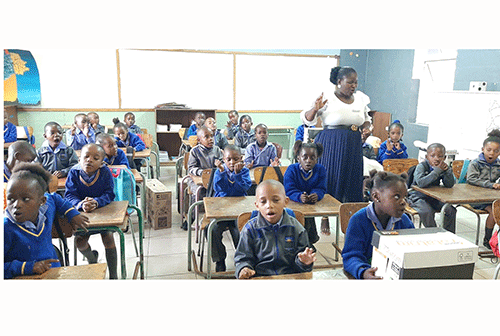SWAKOPMUND – Walvis Bay Rural constituency councillor Florian Tegako Donatus has taken issue with government’s decision to handpick August 26 Construction as the preferred bidder to construct schools in Erongo.
This, the politician said, robs local business people from economic opportunities, and is therefore unfair.
The Independent Patriots for Change (IPC) politician said the ongoing construction of classrooms and schools in the region overlooks the involvement of local entrepreneurs.
Donatus registered his dismay on the sidelines of the Erongo state of the region address which was delivered by governor Neville Andre a fortnight ago.
The handy politician stated that the construction of classrooms and schools exclusively by August 26 Construction has adverse consequences for the industry, particularly impacting local entrepreneurs at the coast.
The said exclusionary approach is a result of a Cabinet directive issued in January, urging the urgent acceleration of plans to construct classrooms in collaboration with August 26 Construction.
Donatus noted that the directive puts entrepreneurs in the construction industry at a disadvantage as August 26 has the upper hand.
“While we acknowledge that there are companies which fail to deliver after receiving tenders, it would be unfair to penalise everyone for their actions. This directive is adversely affecting our local entrepreneurs,” he reasoned.
Donatus then urged the Erongo governor to intervene and request that the government reassesses this directive, ensuring a level playing field for all participants in the construction industry.
August 26 Construction is a subsidiary of August 26 Holdings, the controversial defence company that has refused to account for public funds.
Millions
The government is set to spend at least N$117 million on the construction and renovation of two schools in the Erongo region between now and next year.
This is while several construction and renovation works are already taking place at various schools in the region.
This, Andre said, is attributable to urban migration to the coastal towns, which poses a challenge in terms of space for pre-primary, Grade One and Grade Eight learners.
The region is experiencing a steep increase in learner enrolment every year, prompting the expenditure of millions on annually constructing at least four new schools, additional classrooms, ablution facilities and hostel upgrades in the region.
“A new secondary school consisting of 12 classrooms and two ablution blocks is being constructed in Swakopmund. Additionally, two extra classrooms have been built at High Hope Primary School in Walvis Bay, and an additional pre-primary class has been added to the Ebenezer Primary School in Karibib,” Andre said.
Learner placement at the coast is so dire that parents endure the harsh coastal weather by sleeping at schools, just to secure a spot.
Increase
Erongo recorded an increase in learner enrolment from 51 942 in 2022 to 53 538 learners in 2023. The number of teachers has also increased from 1 806 to 1 913 in 2022.
Andre shared this progress during his address, where he also indicated that three new schools will be built in Swakopmund and Walvis Bay, one of which is nearing completion.
Among the ongoing projects is the construction of a primary school in Swakopmund, scheduled for completion in May next year. This school will cost N$49 million.
Furthermore, Andre noted that the renovation and construction of new hostel blocks at the !Oe#gab Primary School in Tubusis are underway, with a N$68 million price tag attached to it.
The education ministry has likewise contracted August 26 Construction for the erection of a 16-classroom secondary school in Swakopmund, and a 24-classroom secondary school in Walvis Bay.
The controversial defence company will then construct four additional classrooms at the SI Gobs Secondary School in Omaruru, four classrooms at Ebenezer Primary School in Karibib, three classrooms at Ubasen Primary School in Omaruru and two classrooms at the Omaruru Primary School.
“While addressing the aforementioned infrastructure needs, the region faces challenges with dilapidated educational buildings due to coastal weather conditions and a lack of funds for maintenance. We call on stakeholders to collectively address these challenges, build more schools and renovate existing infrastructure in the region,” pleaded Andre.
In January, following the dismal Grades 11 and 12 examination results, President Hage Geingob highlighted during a visit from the education ministry’s top brass that challenges confronting the education sector include a shortage of classrooms.
This is amongst others attributed to the deliberate decision made by the Namibian government to provide free, equitable and quality education to every Namibian child, he said at the time.
Geingob observed that these reforms are the cornerstone of the Namibian education sector’s success in granting access to education to all children, resulting in increased enrolments. However, this has led to a nationwide shortage of classrooms.
Photo caption: Parents who recently lined up at the Kuisebmond Primary school to enrol the learners.
Caption:


